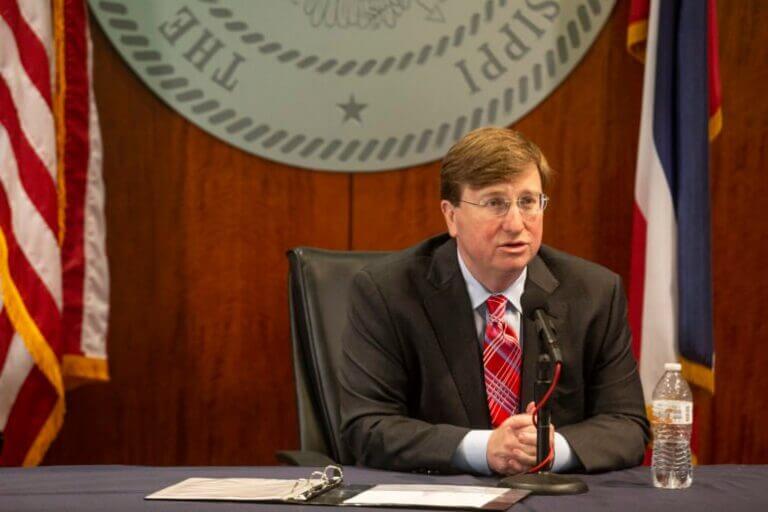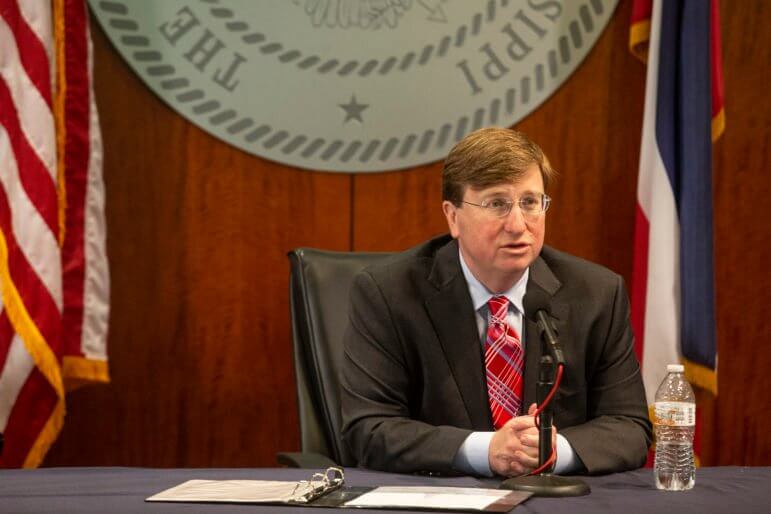

Eric J. Shelton/Mississippi Today, Report For America
Gov. Tate Reeves vetoed funding for two health care related programs earlier this year. Legislative leaders are challenging that veto in the courts.
Whether state money can be spent to fund a program designed to combat healthcare disparities in poor and minority communities and help reopen a north Mississippi hospital could depend on how quickly the Mississippi Supreme Court acts, according to legislative supporters of the programs.
A lawsuit is pending before the Mississippi Supreme Court over whether Gov. Tate Reeves’ partial vetoes of $6 million for the program to address health care disparities related to COVID-19 and to spend $2 million to help reopen the North Oak Regional Medical Center in Senatobia are constitutional.
The legislation approved this summer mandated that the funds for the programs be spent by Dec. 15 or else the money would be diverted to the state’s unemployment compensation trust fund. That fund has been depleted this year because of the record number of people losing their jobs because of the COVID-19 pandemic.
House leaders filed a lawsuit in August challenging the constitutionality of Reeves’ vetoes — one of many instances in 2020 that Republican legislative leaders have clashed with the Republican governor. They claim that past court rulings significantly limit a governor’s partial veto authority and that Reeves’ actions exceeded that authority.
READ MORE: Speaker Philip Gunn says lawsuit over Gov. Tate Reeves’ vetoes is ‘unfortunate’ but necessary.
It looked as if Reeves’ actions would thwart funding for the programs regardless of how the courts ruled because of the time limits placed in the legislation.
But Rep. Robert Johnson, D-Natchez, the House minority leader and a leading advocate of the funding for the health care disparities program, said he believes the money could still be spent if the Supreme Court rules quickly.
“If the Supreme Court rules the partial vetoes were not proper, the law would go into effect immediately, and they (Federally Qualified Health Centers) could distribute the money,” he said. The program is being run by some of the Federally Qualified Health Centers that are located throughout the state to provide health care for the needy.
Johnson said he believes the centers could meet the Dec. 15 deadline by hiring staff and putting the program in place.
The funding for the hospital, which closed recently, was contingent on an agreement being in place by Oct. 1 to reopen the medical center.
Rep. Trey Lamar, R-Senatobia, says an agreement was reached in September for a group to reopen the North Oak Regional Medical Center, but the reopening as it stands now is dependent on receiving the $2 million in state funds that Reeves vetoed.
Lamar said if the Supreme Court rules the partial vetoes are unconstitutional the money can be transferred to Tate County to be used by the hospital
“Obviously timing is getting to be an issue,” Lamar said.
The hospital and health care disparities program were part of $91 million designated to the Department of Health to be appropriated to hospitals throughout the state and to other health care providers to help with efforts to combat the coronavirus. The money came to the state from the federal Coronavirus Aid, Relief and Economic Security (CARES) Act.
READ MORE: Gov. Tate Reeves vetoes education budget, criminal justice reforms, COVID-19 spending.
The federal legislation requires the funds to be spent by the state by Dec. 30 on projects related to combatting the pandemic. Lamar reasoned that the hospital could still get the money at this late date because re-opening the hospital during the pandemic is more costly and thus the money would be spent on COVID-19 related costs.
The Supreme Court heard oral arguments in the case last month. At the time, Chief Justice Michael Randolph said he understood the need for the state’s highest court to act as quickly as possible.
“We will render a decision within due course, which we recognize your request that due course be expedited, and we will make an attempt to do that,” Randolph said at the closing of oral arguments. “These are difficult decisions. We have a lot of work to do.”
The issues in the case have been clouded by the claims of Reeves’ attorney, Michael Bentley of Jackson, and Supreme Court Justices Josiah Coleman and James Maxwell II, both of the Northern District, arguing that this case is different than other high court rulings on partial vetoes because the Legislature was in session when the Reeves issued the partial veto earlier this summer. They claim the Legislature was not in session in other cases when the Supreme Court ruled governors’ partial vetoes were improper.
READ MORE: Supreme Court justices lacking some facts during oral arguments on governor’s partial veto.
In reality though, the Legislature was still in session in 2002 when then-Gov. Ronnie Musgrove vetoed a portion of the budget for the Department of Corrections setting aside money for private prisons. The Supreme Court found that partial veto unconstitutional in one of the three landmark rulings on the partial veto issue.
The Senate Journal and news articles of the time show that Musgrove issued the partial veto on April 9. The Legislature did not end its session until April 12, according to the House Journal and Senate Journal, which are viewed as the official record of the Legislature.
Bentley maintains that language in the Senate Journal positioned above the partial veto, but set off with bars from the partial veto, indicate that the Legislature ended the session for the year (sine die) before the partial veto. People familiar with the compilation of the journals, speaking unanimously because they have not been authorized to speak to the media, said the language is apparently a mistake.
The reason it is a mistake is that House and Senate journals reveal clearly that both chambers were in session on April 12. The Legislators had passed a resolution earlier in April mandating that they would return on April 12 to take up any gubernatorial veto. The Legislature did override two Musgrove vetoes on April 12 with now Supreme Court Justice Bobby Chamberlin, then a state senator, voting with the majority to override the governor. Legislators in both chambers took up multiple issues that day but did not act to override the Musgrove partial vetoes because the journals reflect that they were not valid. The journals even reflect who gave the opening prayers on April 12.
The House and Senate journals reflect the 2002 legislative session ended sine die at 5 p.m. on April 12. The Constitution allows the Legislature to sine die once during a session and when it does so cannot convene during the calendar year unless called into special session by the governor.
The post Lawmakers say health programs vetoed by Reeves can be funded if Supreme Court acts quickly appeared first on Mississippi Today.
- House passes Jackson water authority bill with more say from city leaders - February 11, 2026
- Two former Delta law enforcement officers plead guilty to drug trafficking - February 11, 2026
- Push to restore Mississippi voters’ right to ballot initiative fizzles again - February 11, 2026